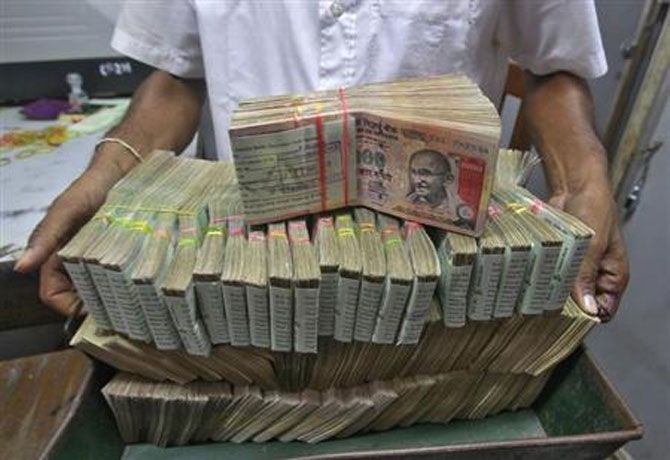Finance ministry’s drive is meant to meet fiscal deficit target and improve overall efficiency in government spending.
 To ensure that the fiscal deficit target of 3.9 per cent of gross domestic product (GDP) is met for the year, the finance ministry has reportedly told the departments concerned that, for the January-March quarter, it might not be forthcoming in support of the schemes which couldn't properly utilise the funds issued in the first three quarters of the year.
To ensure that the fiscal deficit target of 3.9 per cent of gross domestic product (GDP) is met for the year, the finance ministry has reportedly told the departments concerned that, for the January-March quarter, it might not be forthcoming in support of the schemes which couldn't properly utilise the funds issued in the first three quarters of the year.
This is also meant to bring about overall efficiency in government spending and to ensure that funds are not allocated just as a formality.
"The expenditure department has told other departments that it would prefer releasing money for only those schemes which saw healthy spending," said a senior government official.
Social sector schemes and schemes of national importance are unlikely to fall in this ambit.
For example, some officials said the finance ministry is not keen to release Rs 12,000 crore (Rs 120 billion) from the Gross Budgetary Support (GBS) of Rs 40,000 crore (Rs 400 billion) allocated to Indian Railways in the current financial year - citing "poor pace" of work done.
The current financial year's budgeted GBS was Rs 10,000 crore more than last financial year's Rs 30,000 crore (Rs 300 billion).
"Railways' spending from its GBS by the end of December was more than the internal target set by us. It is more than even the last financial year's GBS spending of Rs 22,000 crore (Rs 220 billion) in the same period. The reluctance comes as a surprise," a rail ministry official said.
Sources from other ministries including agriculture confirmed that such instructions have come from the finance ministry, mainly to ensure efficiency.
It is also learnt that the external affairs ministry has approached the finance ministry with revised estimates which are higher than the budget allocation of about Rs 15,000 crore (Rs 150 billion).
According to sources, the finance ministry has not responded in a very positive manner to this proposal.
This, however, is not the first time the finance ministry is going for fiscal discipline in the fourth quarter of a financial year.
During the United Progressive Alliance government, all departments were told not more than 33 per cent of the allocated sum should be spent in the fourth quarter.
This was done to encourage departments to spend evenly across the year and to discourage wastage of funds.
Senior policymakers, including Finance Minister Arun Jaitley, Minister of State for Finance Jayant Sinha and Chief Economic Advisor Arvind Subramanian, have repeatedly said fiscal deficit will be contained at 3.9 per cent of GDP.
"It is a strict target in the backdrop of lower-than-expected disinvestments and direct tax collections, lower nominal GDP growth, higher spending in certain flagship schemes and record capital spending this year," said a senior official. Nominal GDP is expected to grow at around 8.2 per cent, compared with 11.5 per cent projected earlier.
The revised estimate for proceeds from disinvestment is likely to be around Rs 30,000 crore, compared with Budget estimates of Rs 69,500 crore.
Meanwhile, for direct taxes, the shortfall is expected to be Rs 40,000 crore, which will be partly balanced by encouraging indirect tax proceeds, Revenue Secretary Hasmukh Adhia has said.
Recognising that schemes such as Mahatma Gandhi National Rural Employment Guarantee Scheme (NREGS) are an effective way to boost rural consumption, the government has spent Rs 41,699 crore (Rs 416.99 billion) on the scheme so far this year.
That is the highest ever outlay for the scheme.
The government has also boosted public spending in infrastructure at a time when private sector balance sheets are stretched.
For April-November, the Central government's capital spending was nearly Rs 1.59 lakh crore, a whopping 32 per cent more than the same period last year.
Recognising good work
- FinMin prefers schemes with healthy spending in first 3 quarters for 4th quarter allocations
- Move is meant to contain the fiscal deficit and ensure efficiency in government spending
- Social sector schemes and programmes of national importance not likely to see any allocation cut
- Centre has spent around Rs 42,000 crore on MGNREGS, the highest ever
- In UPA regime, too, all departments were told that not more than 33 per cent of the allocated sum should be spent in the 4th quarter










